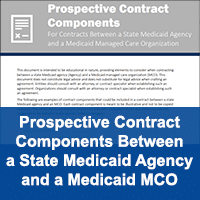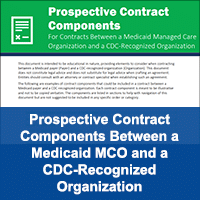Medicaid → Fiscal Operations → MCO Contracting
MCO Contracting
Contracting with Medicaid managed care organizations (MCOs) is an important step to achieving sustainable reimbursement for the National Diabetes Prevention Program (National DPP) lifestyle change program.
In states electing to cover the National DPP lifestyle change program, MCOs may need to work with the state Medicaid agency to set rates, establish cost reporting expectations, and secure amendments to existing contracts. In states that do not yet have Medicaid coverage of the National DPP lifestyle change program, MCOs can elect to offer the program through a pilot or as a value-added service. To learn more about these options, please visit the Engaging MCOs to Attain Coverage page of the Coverage Toolkit.
These options will require the MCO to contract with the organization providing the National DPP lifestyle change program. As an alternative to contracting directly with CDC-recognized organizations, some MCOs may choose to contract with a third-party organization to administer the National DPP lifestyle change program. Third-party organizations can work with MCOs to establish a network of CDC-recognized organizations, work with health care providers, and recruit eligible individuals into the program. MCOs can tap into a network of CDC-recognized organizations in what is called an umbrella hub arrangement (UHA). The UHA is administered by an umbrella hub organization (UHO), who holds CDC-recognition on behalf of a network of community-based organization (CBOs) delivering the National DPP lifestyle change program, known as subsidiary organizations. For UHAs, fully executed contracts between the MCO and the UHO ensure that each of the subsidiary organizations have access to this reimbursement pathway. Additional information on UHAs, including resources to help educate partners on the UHA, are available on the UHA pages of the Coverage Toolkit.
This page provides sample language for state MCO contracts as well as sample language and general guidance for contracts between MCOs and CDC-recognized organizations or UHOs.
- Contracting Between the State Medicaid Agency and MCOs
- Timing and Opportunities for State Medicaid Agency and MCO Contracts
- Contracting Between MCOs and CDC-Recognized Organizations or UHOs
- Credentialing CDC-Recognized Organizations
- Negotiating Reimbursement for CDC-Recognized Organizations or UHOs
Contracting Between the State Medicaid Agency and MCOs
Contracted MCOs in states electing to cover the National DPP lifestyle change program will need to either amend their existing MCO contracts or create new ones, at the discretion of the state Medicaid agency. State MCO contracting varies across states, so processes and requirements will differ for each state and MCO. However, some provisions, such as services, rates, and cost reporting requirements, are likely to be found across contracts. This section provides information regarding contract amendments and provides sample contract language.
Contract Language Considerations
Some common elements recommended for inclusion in amended contracts between the state Medicaid agency and the MCO include:
- Program eligibility requirements
- Description of covered services
- Program promotion and enrollment expectations
- Data sharing and reporting expectations
- Rate information
- Provider network expectations
- Subcontractor requirements
The Prospective Contract Components Between a State Medicaid Agency and a Medicaid MCO document below includes language related to these prospective contract elements. It is intended to be educational in nature, providing elements to consider when contracting between a state Medicaid agency and an MCO. It does not constitute legal advice and does not substitute for legal advice when crafting an agreement. Entities should consult with an attorney or contract specialist when establishing such an agreement.
For more information to support rate-setting, see the Reimbursement Models for Medicaid Agencies and MCOs page of the Coverage Toolkit.
Timing and Opportunities for State Medicaid Agency and MCO Contracts
MCO contracts are amended at the discretion of the state Medicaid agency. However, there are some specific opportunities that partners should be aware of to influence the inclusion of the National DPP lifestyle change program in MCOs contracts. These include:
- When new MCOs are selected: States rebid their MCO contracts through a process called procurement. When and how often states go through procurement varies from state to state, but typically procurement occurs every three to five years. Minnesota, for example, by law requires MCO re-procurement to occur every five years. A state’s procurement cycle may be influenced by state procurement laws and rules, contract end dates, MCO performance, changes to the MCO landscape such as merger and acquisition activity, and other factors. States can engage in two types of procurement: a competitive bidding process where awards are given to the highest scoring, qualified bidders, or an “any willing plan” process where states can accept any willing and qualified bidder. The procurement process provides an opportunity for new MCOs to enter the market and for the state to update MCO contracts to reflect current state priorities. Reference to the National DPP lifestyle change program can either be included in the state contract or in the request for proposal (RFP) that goes to interested health plans or other entities. For example, the contract and/or RFP can require plans to engage in population health or prevention-focused activities such as the National DPP lifestyle change program.
- When MCO contracts are open to renewal: In some states, MCO contracts are open to renewal even if the state is not engaged in a formal rebidding process. This provides an opportunity for both the state Medicaid agency and the MCO to renegotiate contract terms and for the state Medicaid agency to enter into a rebidding process if contract terms cannot be agreed on. Renewal, however, may not change the base contract and in this case the state and the MCO could agree to an amendment that adds the National DPP lifestyle change program to the contract.
- As designated in the MCO contract or by the state Medicaid agency: Most MCO contracts include a clause that allows the state Medicaid agency to renegotiate contract terms on an annual or other regular basis. Additionally, in some states, the state Medicaid agency can issue changes through other processes. For example, in Maryland the state Medicaid agency can use contract transmittals to make changes to existing MCO contracts.
MCO procurements and contracts are public information and should be available on the state Medicaid agency website or as requested by the state Medicaid agency.
Contracting Between MCOs and CDC-Recognized Organizations or UHOs
Prior to contracting with MCOs, CDC-recognized organizations and UHOs will need to identify and leverage opportunities to engage with MCOs. Information on how to engage with MCOs, including tips for where to connect and who you should consider engaging with, are available on the Engaging MCOs to Attain Coverage page of the Coverage Toolkit. Once relationships have been developed, CDC-recognized organizations and UHOs can initiate the contracting processes. Contracts between MCOs and CDC-recognized organizations (or UHOs) should outline expectations between the parties and include CDC’s Diabetes Prevention Recognition Program (DPRP) standards. This process can be unfamiliar and daunting for MCOs, CDC-recognized organizations, and UHOs alike. The section below provides guidance and considerations for contract type, language, and tips for executing contracts. It is important to note that even though CDC-recognized organizations and UHOs have experience with meeting CDC’s DPRP standards, many of these organizations will likely be new to the state Medicaid program and may not understand Medicaid program standards, the Medicaid participation process, and MCO contracting procedures. Additional time and/or training may be necessary to assist partners in these processes.
Contract Type
Because MCOs often provide a range of services with a widespread network of partners, there are multiple contract types that can be utilized when initiating agreements, these include an organizational provider contract, an ancillary services contract, and a vendor agreement. Organizational provider and ancillary services contracts will be more like each other than a vendor agreement. These are often managed by separate contracting divisions within the MCOs, meaning they could have different rules around timelines, review, or signatory processes. Given the nuances of the National DPP lifestyle change program, regardless of the starting contract type, there will need to be modifications of the contract template.
This section will not discuss practitioner contracts – a contract between individual Lifestyle Coaches and the MCO. A standard practitioner contract would typically contain requirements specific to a health care provider, such as minimum levels of malpractice insurance, hospital privileges, and regular maintenance of licensure or board certification which are not relevant to a National DPP Lifestyle Coach.
- Organizational Provider Contracts and Ancillary Services Provider Contracts: A CDC-recognized organization or a UHO could be considered an organizational provider especially if the state creates a certification process of some kind or if the MCO creates its own standards for inclusion in the MCO network (to read more about credentialing, please see the section below titled, Credentialing CDC-Recognized Organizations). The MCO is likely to have a standard template(s) for these contracts, which is a good place to start. Modifications to a contract template will likely include things like a requirement to maintain CDC recognition, Lifestyle Coach training, outcomes reporting, and other obligations required of the CDC-recognized organization or UHO such as screening for health-related social needs (HRSN) and communication requirements with the MCO. Likewise, it may contain obligations of the MCO like providing eligibility lists, timely payment of claims, etc. A penalty clause for failure of either side to meet its obligations, often with a cure period, may also be incorporated. To learn more, please see the Contract Language Considerations section below.
- Vendor Agreements: Vendor agreements may also work for contracts between MCOs and UHOs or CDC-recognized organizations, but this contract type seems a better fit for an MCO and a UHO as it is a more “business to business” contract. It would likely contain similar obligations as noted above for maintaining CDC recognition and Lifestyle Coach training by the subsidiary organizations as well as similar obligations by the MCO.
Whatever the contract type, provisions for screening for HRSN as well as provisions for additional services by the CDC-recognized organization, like outreach efforts to Medicaid beneficiaries, could be included in the contract as alternative payment methods/value-based payments. MCOs, however, may want to limit contract language in the primary contract to reimbursement for National DPP lifestyle change program delivery, and not include additional services such as HRSN screening or program supports. However, in these instances the MCO may be open to executing multiple contracts. For example, CDC-recognized organizations or UHOs could execute a contract for delivery of the National DPP lifestyle change program and a secondary contract to address other functions.
Contract Language Considerations
Some common elements recommended for inclusion in contracts between MCOs and CDC-recognized organizations or UHOs include:
- Program eligibility requirements
- Description of covered services
- Program promotion and enrollment expectations
- Reimbursement schedule and billing codes (if applicable)
- CDC-recognition requirements
- Data sharing and reporting expectations
- Patient data confidentiality
- State-specific requirements, where applicable
The Prospective Contract Components Between a Medicaid MCO and a CDC-Recognized Organization document below includes language related to these prospective contract elements. It is intended to be educational in nature, providing elements to consider when contracting between an MCO and a CDC-recognized organization. It does not constitute legal advice and does not substitute for legal advice when crafting an agreement. Entities should consult with an attorney or contract specialist when establishing such an agreement.
Additional MCO Contracting Considerations for UHOs
The Prospective Contract Components document above may provide a foundation for executing contracts between an MCO and a UHO, however, additional considerations will likely need to be made to fit the unique nature of the UHA model. Through the contract, the UHO becomes responsible for maintaining certain standards within their network of CDC-recognized organizations, which provides the opportunity to streamline processes but does require some administrative coordination efforts on the part of the UHO. Executed contracts between the UHO and the MCO provide an opportunity to set expectations across the entire network. Additional considerations for UHOs contracting with MCOs are provided below.
- Descriptions of covered organizations and providers: The UHO will need to be specific when negotiating who and what is covered under the contract terms. Coverage will need to include each of the subsidiary organizations in the UHA and every Lifestyle Coach within those organizations. The definitions and qualifications for each party will need to be clearly defined. MCOs and UHOs will need to determine processes for updating MCOs with additions or changes to subsidiary organization or Lifestyle Coach rosters. UHOs will also want to work with the MCO to determine which delivery modalities offered by their subsidiary organizations are reimbursable by the MCO. UHOs are also responsible for understanding and updating standard MCO contract terminology. For example, UHOs might consider changing references of “licensed providers” to “CDC-recognized organizations.”
- Liability and insurance requirements: Since the UHO is responsible for the activities of multiple subsidiary organizations, the MCO may want to ensure their insurance covers this type of network arrangement.
- Additional data collection, reporting, or quality assurance requirements: MCOs may have expectations that contracts between the UHO and the MCO include terms which hold the UHO responsible for the subsidiaries in the UHA, including requirements to monitor subsidiary performance or education and training of Lifestyle Coaches. This may also include additional requirements to monitor the exchange of reimbursement, as it is passing through a third-party organization before reaching the subsidiary organization. In addition to data requirements imposed on the UHO by the MCO, the UHO may also be able to negotiate additional provisions which require the MCO to provide regular data lists on eligible members or referring providers. This information may be useful to the UHO in increasing the number of participants in the National DPP lifestyle change program.
- Penalty clauses: UHOs and MCOs may want to include what are referred to as “penalty clauses” in the contract that outline what will happen if the UHO or MCO fails to meet their National DPP lifestyle change program contractual obligations. For example, if the contract states that the MCO will pay National DPP lifestyle change program benefit claims within 30 days of receipt, the penalty clause may include interest on overdue money owed to the UHO. Conversely, if the contract states that the UHO will send reports to the MCO and it fails to do so, the MCO may withhold payment.
- Evaluation of National DPP lifestyle change program processes: UHOs are encouraged to use contract negotiations as an opportunity to include provisions which allow for data sharing between the UHO and the MCO. This allows for the UHO to perform evaluations and improve processes related to participant identification, outreach, enrollment, and retention efforts. For example, provisions could include a requirement for MCO partners to provide monthly eligibility lists or for UHOs to provide data on outreach attempts.
Tips for Contracting with MCOs
CDC-recognized organizations and UHOs can consider the following tips when negotiating and executing contracts with MCOs.
- Approach the process with patience and manage expectations across organizations: Fully executing a contract between the MCO and the CDC-recognized organization or UHO can take time. On average, this takes about 90 days but can take significantly longer depending on organizational legal processes. It is important to keep all involved parties up to date on items such as reimbursement, outreach and referral, and cohort timelines. Partners can consider a recurring phone call or meeting that starts with the contracting process and extends through delivery of the National DPP lifestyle change program.
- Dedicate time to understanding complex contracting terminology: MCOs are traditionally involved in the delivery and reimbursement of clinical care, and therefore the language may involve complex terminology and acronyms that are not typically used in chronic disease management and population health programs. Alternatively, MCOs may not be familiar with language surrounding the delivery of the National DPP lifestyle change program. To expedite negotiations, partners can consider adapting MCO terminology to describe National DPP lifestyle change program services. This may also involve removing language that is specific to clinical providers, such as provisions about emergency services, hospital privileges, or board certification. Because MCOs traditionally execute contracts with clinical professionals, UHOs and CDC-recognized organizations will need to review and remove language that is outside the scope of the National DPP lifestyle change program.
- Consider methods to reduce contract complexity through state coverage requirements: In states where the National DPP lifestyle change program is a Medicaid covered benefit, state partners can include benefit language that can reduce the complexity of MCO contracts. For example, by developing a unique provider type to allow for delivery of the program, CDC-recognized organizations or UHOs can reduce the need to include additional language defining provider type and credentialing requirements.
- Take advantage of MCO resources: To streamline communications, partners can utilize existing MCO resources, such as the MCO website or frequently asked questions documents to answer questions or provide clarification. The MCO may also have a standard contract template that can be sent to your organization for editing rather than having a completely new contract drafted. MCOs may also have contract managers or call centers available to clarify contract provisions during the review process. When your organization has a confirmed contract, you may be granted access to the MCO’s provider portal to do a variety of activities including verifying patient eligibility and benefits, looking up medical claims, viewing electronic provider care notes, and adding other staff as users.
Credentialing CDC-Recognized Organizations
An important aspect of contracting with an MCO and serving their members is becoming ‘credentialed’ with an MCO. This process is not well defined for a unique provider type such as a CDC-recognized organization and/or UHO. MCOs are more familiar with working with practitioners and organizational providers/ancillary providers. This section defines what is meant by credentialing and outlines the considerations for a state Medicaid agency, an MCO, and a CDC-recognized organization and/or UHO when attempting this.
A note about UHOs: If a UHO is a CDC-recognized organization offering the program and they contract with an MCO they would have to be credentialed with the MCO, but if the UHO is acting as a third party administrator the MCO would delegate or ‘pass through’ the obligation to the UHO to only bring on CDC-recognized organizations as subsidiaries that meet specified criteria negotiated as part of the contract between the MCO and the UHO.
Understanding Credentialing
For the purposes of this discussion, a practitioner is an individual who delivers a service to a member of the MCO. An example of a practitioner is a physician or an advanced practice nurse. An organizational provider is an organization that delivers health care services to members of the MCO. An example of an organizational provider is a home health agency or a skilled nursing facility. Ancillary providers are organizations that provide outpatient diagnostic or therapeutic services. Examples of diagnostic services are laboratory testing, radiology services, and ambulatory cardiac monitoring. Therapeutic ancillary services include things such as home care, physical therapy, and durable medical equipment suppliers.
Practitioners
Practitioners who wish to participate in an MCO’s network need to complete a practitioner contract and undergo credentialing. Until the contract is signed and the credentialing process is completed, the practitioner may not provide services to the MCO’s members.
The practitioner credentialing process for an MCO is complex and multistep. Its purpose is to ensure that the health care providers in the MCO’s network meet the MCO’s quality standards. A credentialing application includes, among other things, information about education, board certification, licensing, any adverse actions in the past against their license in any state, any prior and pending malpractice suits, and malpractice insurance carrier information. Many organizations now use the Council for Affordable Quality Healthcare (CAQH) to streamline the process. CAQH allows the practitioner to enter their information about education, board certification, licensing, malpractice, etc. once, and then the practitioner grants access to their information to a health plan with which they hope to contract. It replaces the prior process where a practitioner had to complete an application (with basically the same information) for multiple health plans.
Practitioner Credentialing Process Workflow
The MCO reviews the practitioner’s application against its internally developed criteria and performs what is called a primary source verification. This verification process goes back to the beginning of the practitioner’s education and confirms with the original entity that the information is true. For example, the process will confirm that a physician attended college and graduated, attended medical school and graduated, passed the board examination in their specialty, etc. It also includes work history, validation of malpractice insurance, and a check for any Medicare or Medicaid sanctions that would prohibit participation by the practitioner. This is a slow and detailed process that may take several months to complete.
Once the verification process is complete, the request moves on to the Credentialing Committee, a peer review committee that meets on a monthly or quarterly basis and whose deliberations are highly confidential. The Credentialing Committee is usually composed of various practitioners including primary care physicians and specialists who provide expertise and input into the decision to credential or not credential the requestor. Ideally the Credentialing Committee includes at least one practitioner familiar with the type of practitioner to be credentialed or can consult with one who does if there is no expert on the actual committee. Large health plans may have Credentialing Committees for different practitioner types, i.e., one for physicians, one for psychologists, etc. Practitioners are recredentialed every three years.
Organizational Provider
Just as with practitioner credentialing, an MCO must have a process in place to evaluate the quality of an organizational provider before it completes a contract and before any members receive services. Examples of organizational providers include hospitals, home health agencies, and skilled nursing facilities. Like practitioner credentialing, recredentialing for organizational providers is completed every three years.
Organizational Provider Credentialing Process Workflow
The process to credential an organizational provider is less complex than the process to credential a practitioner. It requires an MCO to confirm that the organizational provider is in good standing with state and federal regulatory bodies and has been reviewed and approved by an accrediting body if applicable. If there is no accrediting body, then an onsite quality assessment by the MCO is required which must include determining that the organizational provider is credentialing its practitioners and/or assuring the quality of the practitioners in the organization. In the case of a hospital, for example, the Centers for Medicare and Medicaid Services (CMS) (for Medicare) would be the accrediting body and the hospital would perform the traditional credentialing function as described above with primary source verification, Credentialing Committee review, etc. for the licensed professionals working at the hospital. In the case of a CDC-recognized organization, an MCO audit would likely focus on assuring that the organization has CDC recognition and that the Lifestyle Coaches receive appropriate training (more on this below).
Credentialing Considerations for CDC-Recognized Organizations
The organizational provider credentialing category outlined above is the best fit for a CDC-recognized organization, but it does require effort on the part of the state Medicaid agency, the MCO, and the CDC-recognized organization to make it work. These considerations are outlined below:
- State Medicaid agency considerations:
- The state Medicaid agency would need to develop a process and accredit the CDC-recognized organizations in its state. This is the approach Maryland Medicaid took when it created a new Medicaid provider type for CDC-recognized organizations. Maryland Medicaid defined the credentialing criteria for CDC-recognized organizations by including additional requirements and attestations regarding CDC’s DPRP Standards and Lifestyle Coach training in the application and approval process for participation in Medicaid. This created a situation where any CDC-recognized organization approved by Medicaid could contract with any of the Maryland MCOs and the MCOs, in turn, could contract with any CDC-recognized organization approved by the state Medicaid agency. Creating a new provider type is time consuming for the state, but it can simplify the entire process and is worth the effort. It also sets the stage for accurate reporting for both the MCOs and the state Medicaid agency for utilization and costs.
- Having the state Medicaid agency act as the accrediting authority offers an advantage in that it creates uniform standards across the state which is helpful to the CDC-recognized organizations and can streamline contracting for the MCOs by eliminating the need for organizational credentialing.
- MCO considerations:
- Credentialing CDC-recognized organizations and/or UHOs at the organizational level requires that MCOs create criteria (or use the state Medicaid agency criteria) for a CDC-recognized organization as an organizational provider; this criteria should be based on the CDC’s DPRP Standards.
- The MCO would need to provide oversight for each of the CDC-recognized organizations in their network if there is no state process in place.
- Working with a UHO could streamline the development of a network of CDC-recognized organizations since one contract negotiation could bring multiple subsidiaries into the MCO’s network.
- Working with a UHO will eliminate the need to work with multiple CDC-recognized organizations enrolled as Medicaid providers on the claim’s submission process, most of which may have had no prior experience.
- CDC-recognized organization and/or UHO considerations:
- It is recommended that the UHO obtain a unique National Provider Identifiers (NPI) number, a unique 10-digit number that reflects the Health Insurance Portability and Accountability Act (HIPAA) Administrative standard, for their role as a UHO. UHOs and their subsidiaries will obtain an organizational or Type 2 NPI, used in healthcare transactions such as claims, enrollment requests and other related transactions. Lifestyle Coaches may also need to obtain an individual provider or Type 1 NPI to provide National DPP services. Additional information on NPIs for the UHA are available on the UHA Reimbursement page of the Coverage Toolkit.
- If a CDC-recognized organization and/or UHO were an organizational provider, they would have to develop criteria for credentialing their own Lifestyle Coaches; this criteria should be based on the CDC’s DPRP Standards.
Negotiating Reimbursement for CDC-Recognized Organizations or UHOs
Reimbursement for the National DPP lifestyle change program through MCOs will vary state by state. In states where there is Medicaid coverage for the National DPP lifestyle change program, Medicaid may set minimum reimbursement rates that need to be included in MCO contracts or in the Medicaid fee schedule. In states undergoing a pilot program or independently contracting for coverage through MCOs, there may be more flexibility in how the program is reimbursed and through what methods. These may include fee-for-service, attendance milestones, performance-based or value-based models, or combination reimbursement methods. UHOs and CDC-recognized organization are encouraged to advocate for reimbursement to cover services outside program delivery, such as patient outreach, HRSN screening, or provision of program supports. Because the UHO takes on significant responsibilities within their role, they may also be able to negotiate administrative fees or operational costs in their reimbursement rates. For additional information on MCO reimbursement models and rate setting, see the Reimbursement Models for Medicaid Agencies and MCOs page of the Coverage Toolkit.











